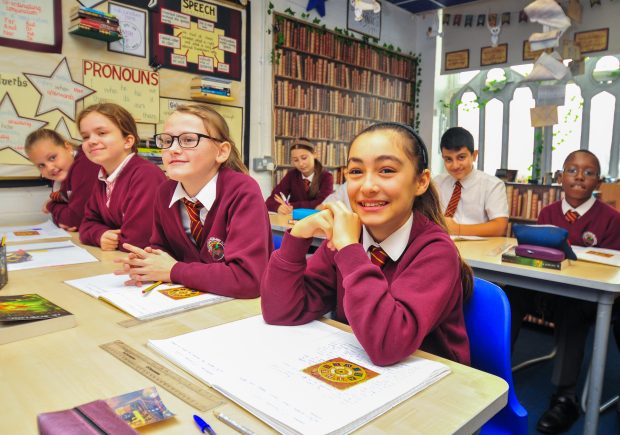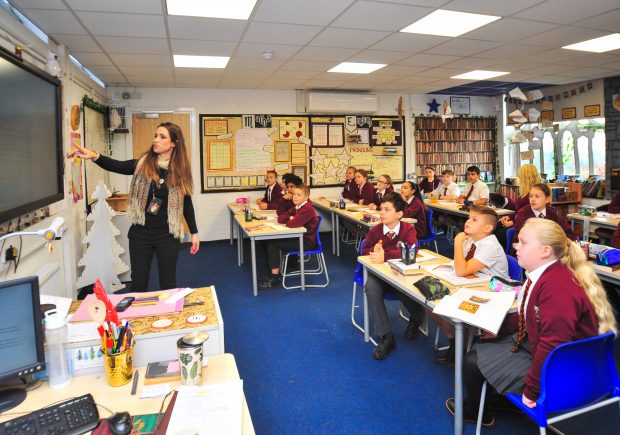
Michael Wardle HMI, Ofsted’s subject lead for languages, discusses our language subject inspections.
Languages are an essential part of a broad, balanced curriculum. Not only do they provide an opportunity to communicate more effectively with others, they also help children to understand what it is to be a global citizen. This includes the importance of tolerance and understanding, which is crucial knowledge in today’s world.
Primary schools have had a legal responsibility to teach languages since 2014. The first cohort of pupils that should have studied languages throughout key stage 2 moved to secondary school in September 2018.
Between October 2019 and March 2020, we carried out 24 languages subject inspections in primary schools. We wanted to identify good practice and strong curriculum management in the subject. We selected the schools at random from schools that we graded as outstanding at their last inspection.
Although we chose these schools at random, it was great to see such a range of languages being taught. As expected, inspectors visited many French and Spanish lessons, though the sample also included German, Mandarin and Modern Hebrew. We also saw some schools offering Latin – the key stage 2 national curriculum includes ancient languages.
Variation in quality
Despite the impressive array of languages on offer, we found a lot of variation in the quality of the curriculum in languages. There were some excellent examples. In some schools, curriculum leaders had thought carefully about the phonics of the language being studied, focusing on how children pronounce sounds and how these are represented in writing. Over time, pupils developed their ability to manipulate simple language step by step, doing work that steadily increased in complexity of simple grammatical concepts. When learning new words, pupils were encouraged to focus on a wide range of commonly used words, which included verbs as well as lists of nouns linked to a topic. In the schools teaching languages really well, pupils were clearly having a brilliant time learning to communicate in a different language and learning about different cultures. This was great to see.
However, given that many pupils should have been leaving Year 6 with four years’ worth of language study, it was disappointing to see how many schools were barely out of the starting block with their curriculum.
In some cases, this was due to changes in staffing when schools lost their language specialist. In others, it was because leaders were focused on other areas of the curriculum. Sometimes, there was just a simple lack of expertise. Whatever the reason, the result was that several schools were only scratching the surface when it came to matching the scope of the national curriculum. In these schools, pupils were only able to respond to a few pre-rehearsed question-and-answer exchanges, and offer a few nouns, colours or numbers when asked.
Different models
We generally found one of three models operating in primary schools:
- a specialist teacher is brought into school to teach languages
- a teacher in school takes responsibility for its organisation and delivery
- a native speaker member of staff is asked to lead the subject
All three of these models can work. In cases where a specialist teacher visits the school, class teachers practised what has been taught during the week in between languages lessons. In schools where a teacher in school was responsible for organisation and delivery of the languages curriculum, they sometimes used bought packages, recorded sound files and organised good subject-specific continuous professional development; upskilling and supporting staff was seen as essential. In those situations where native speakers lead the subject, they received training linked to understanding and teaching their native language, which was pivotal.
In some schools, there was a misunderstanding of how to make progress in languages, step by step. Rather than focusing on the building blocks of a language (phonics, grammar and vocabulary), some schools were simply increasing pupils’ stock of words, through different topics. There was little in the way of linguistic progression. Sometimes, schools had a structure linked to developing listening, speaking, reading and writing. Sometimes, there was a belief in not engaging in written forms of the language at all.
It was interesting to see that some languages were perceived to lend themselves to a more structured approach (Mandarin, Hebrew and Latin) due to inherent features of those languages and their scripts. Here, in these examples, curriculum plans were generally more structured and precise. Each small step for pupils was mapped out, due to the difficulties of the language. Indeed, although pupils had learned less vocabulary and fewer structures, they were expected to ‘do more with less’. Potentially, the teaching of languages more commonly seen in classrooms could learn from this.

Assessment
Our inspectors found that assessment tended to be very limited in languages. In addition, the transition from primary to secondary was underdeveloped. The government’s ambition is that 90% of pupils study the suite of subjects that make up the English Baccalaureate (EBacc) by 2025 (sitting examinations in 2027), which includes an ancient or modern language. That will include pupils in the current Year 5 and below. While we saw some excellent work in our inspections, there wasn’t much evidence of a joined-up approach between key stage 2 and 3. Sometimes, there was very limited communication between primary and secondary schools, and little sharing or shaping of grammar, phonics and vocabulary between settings. Clearly, more focus on progression across the key stages would likely support the EBacc ambition.
Background
These inspections were carried out under section 8 of the Education Act 2005 and in accordance with Ofsted's published procedures for a no formal designation inspection of schools. The inspections were carried out to enable Her Majesty's Chief Inspector to better understand the quality of education in specific subjects provided by outstanding primary schools. Twenty-four languages inspections were carried out between November 2019 and March 2020.
As these inspections only looked into one subject, inspectors were not expected to evaluate or infer the quality of education in the school. This is because the education inspection framework methodology requires a minimum of three subjects to be reviewed in order to draw out systemic features. This was not the purpose of these inspections.
Schools inspected
The full detail of the findings of each inspection are published on each school’s web page on Ofsted’s reports website.
Ashton-on-Ribble St Andrew’s Church of England Primary School, Lancashire
Barnes Primary School, Richmond upon Thames
Bishop Gilpin Church of England Primary School, Merton
Blackpool St Nicholas Church of England Primary School, Blackpool
Coombe Hill Junior School, Kingston upon Thames
Escrick Church of England Voluntary Controlled Primary School, North Yorkshire
Greenfield Primary School, Dudley
Hounslow Heath Junior School, Hounslow
King David Primary School, Manchester
Ladybrook Primary School, Stockport
Larmenier and Sacred Heart Catholic Primary School, Hammersmith and Fulham
Longparish Church of England Primary School, Hampshire
Manor Primary School, Wolverhampton
Orrell Lamberhead Green Academy, Wigan
Our Lady and St Hubert's Catholic Primary School, Sandwell
Sacred Heart Catholic Primary School, Hillingdon
Sacred Heart Roman Catholic Primary School, Manchester
St Cuthbert’s Roman Catholic Primary School, Newcastle upon Tyne
St Mary and St Thomas Aquinas Catholic Primary School, Gateshead
St Peter and St Paul Catholic Primary School, Telford and Wrekin
St Peter’s Eaton Square Church of England Primary School, Westminster
The Batt Church of England Voluntary Aided Primary School, Oxfordshire
Varna Community Primary School, Manchester
Warter Church of England Primary School, East Riding of Yorkshire
6 comments
Comment by Greg Horton posted on
Great that some primary schools are excelling but also too predictable that many are merely paying lip service with a few numbers and colours.
I wrote to the govt a couple of years back pointing out that there is no point in pupils having a statutory right if it is not enforced. The disappointing reply simply said that the current focus was on KS3 uptake. (Well, that's worked well!)
As much as I hate to say it, the only way that MFL will become embedded in the KS2 curriculum if is it becomes part of an Ofsted inspection and primary schools cannot be awarded Outstanding status unless an effective MFL provision is in place.
Comment by John Ubsdell posted on
Too much learning a foreign language is on grammar and note taking.
The emphasis should be on speaking. When I learnt English at the age of 9 months onwards I did not follow my mother with a note book and pencil writing down sentences and verbs masculine and feminine or neutral verbs I spoke the language, I listen to the language, this is what should be the aim in all primaries. Think about Y1 -Y6 then Y7 -Y9 French nine years and we are still far away from being a bilingual nation!!! Look, Listen and repeat not write down these 20 words and learn them, or write a sentence in the past tense for going to the shops and buying a pineapple or The Toolbox is under the driver's seat!!!!!!
Comment by James Milton posted on
I am astounded at the ignorance of both language and language learning Michael Wardle displays in this report. The idea that where schools encourage lexical growth, this is not progress, is entirely wrong. It is probably the one thing reported here that will aid the learners' progress. Learners cannot function in a foreign language, or any language, without words and lots of them. A focus on phonics, when the learners already have a functional phonological system, is a distraction. The system may not be perfect but it will work and there are higher priorities, therefore, like learning more words. The idea that you can build even the basis of a grammatical system without a lot of words is ludicrous. You may be able to illustrate the grammatical system but what are we trying to teach here? A descriptive grammar or a communicative language?
Comment by Jennifer Tulip posted on
It is a disgrace that Ofsted are entering schools during this pandemic & assessing teachers who have been stretched to breaking point, given no support, & pupils who haven't had any proper schooling for over a year who are also stressed & anxious. No recommendations have any validity & the officers have spread the virus in some schools. How can teaching staff & children learn, work & play under such useless pressure.
Comment by annette wood posted on
The curriculum is over crowded and teachers overworked. OFSTED are asking the wrong questions. Rather than : how well is language being taught? OFSTED should ask: how can we fund language teaching in primary schools.
Comment by S. Khan posted on
There's nothing 'randomly selected' about these school, more like specifically cheery picked. Looks like almost every school listed is a Catholic or Church of England school, but all are faiths schools of some kind in the sample selected. Ofsted should be focussing on all schools, especially on the state schools which make up the best majority of schools in England. Just goes to show the vast majority of children in England are receiving a poor inadequate education.
The demands on teachers are unrealistic, the funding for schools is appallingly, yet Ofsted except rediculous provision in schools.
What needs to be highlighted in this report is the fact that schools are underfunded, classes are too big, especially in almost all cities across the board. More need to be done to fund education and give our children an education they deserve. All children and yes, teaching them languages is definitely a brilliant idea but in reality all provision costs a lot of money and at least requires a specialist language teacher delivering and assessing the progress of students.
A luxury most schools can only dream of, esp in inner cities where children come from economically deprived areas.